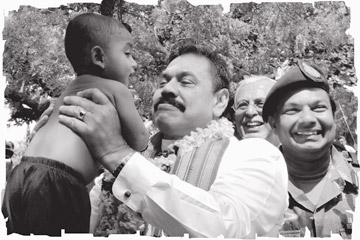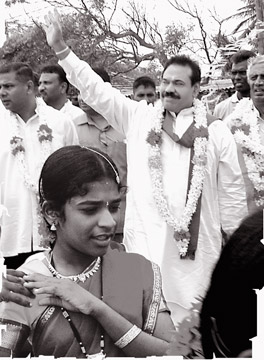|
Pooh-poohing prophets of doom:
Lankan economy's success due to multi-sector approach
It was the 1977 General Election victory that paved the way for the
then United National Party leader J.R. Jayewardene to become the first
Executive President of Sri Lanka. Jayewardene contested from Colombo
West and won 21,707 votes which was a 79.22% from the valid total.
Winning almost all the electoral districts the United National Party won
and its leader J.R. Jayewardene became the Prime Minister of the
Socialist Republic of Sri Lanka. Events thereafter changed the shape of
the political backdrop of the country and this history is known by all.
The ultimate result with the change of the constitution in 1978 was the
introduction of the Executive Presidency.
|

Moving with the young |
This became a good breeding ground for debates and controversies over
the changed situation and it remains the same even today. Many eminent
figures have spoken much against the Executive Presidency and its powers
and in the earlier instances people have given their mandate
accordingly. Yet, when one monitors closely into the changes that took
place from the first Presidential Election of the country in 1982 which
elected J.R. Jayewardene for his second term till 2010 Presidential
Elections that elected Mahinda Rajapaksa for his second tenure in
Presidency, what is read between the lines is that people's decision was
for the personality of the candidate and not criticizing Executive
Presidency. People may seem to be silent until the chance is given for
them to make their honest decision. Using their power to vote since 1931
with the receipt of the Universal Franchise, people make their choices
silently yet steadily.
Slight decline
In 1982, people elected President J.R. Jayewardene for his second
tenure with 3,450,811 votes. In 1988, President Ranasinghe Premadasa was
elected by 2,569,199. Chandrika Bandaranaike Kumaratunga won Presidency
in 1994 with 4,709,205 votes yet in her second tenure her victory was
397,048 votes less than the first occasion. In 2005 Mahinda Rajapaksa
contested and successfully achieved 4,887,152 votes which was a 50.29%
of the total votes. United National Party leader Ranil Wickremesinghe
contesting in the same won 4,706,366 votes. Considering the trend
continued from President J.R. Jayewardene's time, one would observe a
slight decline in the popularity of a President in his/her second term
while the opposing party receives a higher number of votes. Yet for
President Mahinda Rajapaksa the second term victory was a staggering
6,015,934 votes which was a 50.29%. The opposing party in which Sarath
Fonseka contested under a coalition with the UNP, received 4,173,185
votes which was 40.15% of the total valid votes that was a clear 8.2%
low value compared to the votes in 2005 election which the opposing
party received.
|

Caring for the people |
Thus it was the people who elected lower number of votes for the
second tenure in the early instances and it is they who decided
President Mahinda Rajapaksa should be selected with a higher popularity.
It is not the person or the Executive Presidency that matters. What
matters is how comfortable people would be under one's regime. If people
genuinely feel that the poverty level is on the decline, inflation is
going down along with a peaceful and a terror free society no wonder
they hope for a much faster improvement under the same leader. People's
mandate is the crystal clear verdict of the success of a Government's
service to the country and its people.
The Mahinda Chinthana - vision for a better future is leading the
country towards becoming the wonder of Asia. Amidst many challenges Sri
Lanka achieved an economic growth rate of 8.5% in the second quarter of
2010. It was a huge success compared to the 2010 first quarter where the
economic growth rate was around 7%.
Economic crisis
The entire world was confronting a severe economic crisis. The
recession was weakening even countries that were believed to be
unshakable. The International Monetary Fund is worried over the global
state of the financial world. Though many countries claim that they are
recovering from the financial crisis no one can still overlook the
potential problems existing in this shaky situation. World giants were
recording minus economic growth rates. United States of America, United
Kingdom, Japan are still recovering though the huge income and savings
they have as a country support their survival.
The success story is a multi- sector approach. This is not solely an
accomplishment of the industrial sector; the improvement in the rural
economy also contributed largely. Uprise in the rural economy is a
crucial turning point for a developing country like ours where nearly
80% of the population is rural.
An economic growth results with downturns of the poverty line,
unemployment, inflation, number of dependants on Government welfare
measures etc. It is important to facilitate farming and fishing
communities as the agricultural and industrial growth should sprout in
parallel lines. Setting up high prices to purchase paddy, milk and other
food products would lower the prices of the consumer goods thus serving
the common man better. Instead of fattening the pockets of the dairy
farmer in New Zealand or Australia, the Government took steps to
increase the income of the Sri Lankan dairy farmer. Curtailing bread
consumption would finally drive the consumer to buy rice from our paddy
farmers. If this consumption rate is going to continue the Agriculture
Department predicts an excess rice stock of 449,113 metric tons by
December this year.
Government institutions
The World Bank included concepts of Mahinda Chinthana in to the list
of their conditions. Rajapaksa regime signed with the IMF agreeing to
achieve the goals depicted in Mahinda Chinthana. In the conditions from
Sri Lanka it was stated to the IMF that none of the Government
institutions will be privatised. In addition Sri Lankan Government
stated that they will not cut down any of the welfare measures taken to
ease the life of the common people. It was also mentioned to the IMF
that Government contributions to the Public Service, Education, Health
and Road Development and all the other services to the public will
continue.
But in 1990 the then Government had to agree to cut down the ration
on fertilizers in order to get a loan of Rs. 30 million. The agreed
condition was a severe blow to the average farmer. And in 2002 the
Government had to agree to privatise the People's Bank, Inland Revenue
Department, National Insurance Corporation, Petroleum Corporation, the
Railways in order to collect Rs. 556 million. The Mahinda Rajapaksa
Government not only stated about avoiding privatisation of the
Government institutes but subjecting salary cut down of Government
Servants was never considered under the Rajapaksa regime. Eventually
people paid the price with a distressed life.
Though many of the so-called experts of economy and financial matters
become prophets of doom at their leisure, typically highlighting the
negatives of every possible move, the true verdict of the masses is
exceptional. Whatever the international level comments may be the
average man would take the decision on seeing how happy his family would
be. His concern would be to have wonderful future for his children while
every child is treated alike. We may have to go a long way yet the
eminent factor is how people believe in the leader of the country. They
chose a leader who serve the country and deliver the promises. With the
fruitful signs we passed recently it is quite certain people will make
the timely correct decision in time to come. That is the beauty of
democracy.
(DY)
|

